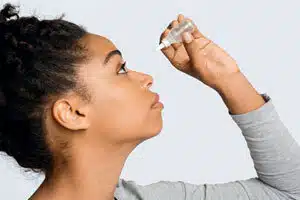Keeping an Eye on Eyedrop Recalls—What consumers need to know about dangerous contamination of a dry eye treatment
October 5, 2023
Dangerous Contamination In Certain Eyedrops

The FDA is warning consumers not to use several brands of eye drops in which tests have discovered fungal and bacterial contamination.
The drops include Dr. Berne’s MSM Drops 5% Solution and LightEyez MSM Eye Drops – Eye Repair, which consumers can purchase without a prescription. These defective products can be very harmful to your eyes and even cause blindness.
Which Eye Companies To Avoid?
According to the FDA, Dr. Berne’s product was contaminated with Bacillus (a bacteria) and Exophiala (a fungus). Testing confirmed The LightEyez drops contained bacterial strains, including Pseudomonas, Mycobacterium, Mycolicibacterium, and Methylorubrum.
Furthermore, both readily available online products are sold illegally, as an active ingredient—methylsulfonylmethane (MSM), a chemical sometimes used to treat arthritis—is not FDA-approved for use in eye drops.
In their warning dated August 22, the FDA said, “There are no legally marketed ophthalmic drugs that contain MSM as an active ingredient.”
Although the agency reached a “verbal agreement” with Dr. Berne’s to recall the contaminated product, the drops can still be found for sale by internet retailers.
“Using contaminated eye drops could result in minor to serious vision-threatening infection which could progress to a life-threatening infection.” the FDA said in a statement. As of late August, fortunately, only two “adverse events” from the dangerous drops had been reported.
However, the current warning and recall follow a similar one earlier this year.
Last spring, the CDC identified more than 80 individuals across 18 states who were sickened from Pseudomonas aeruginosa, a bacterium resistant to most antibiotics. Fourteen of these patients were blinded, four sustained severe injuries that resulted in the removal of an eye, and four more died from their infection.
Bacteria Present In Some Eyedrops
Although Pseudomonas aeruginosa is a common bacteria around us, this particularly virulent, dangerous, and drug-resistant strain had never been found in the US before.
Nearly all the sickened patients reported having used a particular type of eye drops—artificial tears—especially EzriCare Artificial Tears, a preservative-free, over-the-counter product. Three products were voluntarily recalled by their manufacturer, Global Pharma, in association with this outbreak: EzriCare Artificial Tears, Delsam Pharma Artificial Tears, and Delsam Pharma Artificial Ointment.
The outbreak raised concerns about unsafe manufacturing practices in India, where the product was made, and an investigation was launched to determine at what point in the process contamination may have occurred.
The CDC recommended that patients and healthcare providers stop using the recalled products immediately and “properly discard” them.
The list of recent eye drop warnings and recalls includes:
- Dr. Berne’s includes their MSM 5 percent Solution Eye Drops
- Dr. Berne’s MSM 15 percent Solution Eye Drops
- Dr. Berne’s Castor Oil Eye Drops
- Dr. Berne’s MSM MIST Drops 5 Percent Solution
- LightEyez MSM Eye Drops-Eye Repair
- EzriCare Artificial Tears
- Delsam Pharma’s Artificial Tears
- Delsam Pharma Artificial Ointment
According to the National Institutes of Health (NIH) National Eye Institute, artificial tears are the most common treatment for mild dry eye. Typically sold as over-the-counter eye drops, there are also moisturizing gels and ointments that can help the millions of Americans affected by this uncomfortable eye condition.
If your healthcare provider previously recommended that you use any of the brands that are now recalled, ask about alternative treatments that are right for you.
Dry eye vs. eye infection
While dry eyes can cause scratchy, gritty, irritated, stinging, redness and sensitivity to light and blurry vision, it’s essential to know the signs of eye infection.
Signs of Eye infection:
- Discharge from the eye – yellow, green, or clear
- Pain or discomfort in the eye
- Feeling like something is in your eye (foreign body sensation)
- Redness or swelling of the eye or eyelid
- Blurry vision
- Increased sensitivity to light
If you suspect an eye infection, see your eye care provider immediately.
Contact Our Skilled Attorneys Helping You Defend Against Eye Injuries
Aitken*Aitken*Cohn attorneys are trusted advocates for those seeking justice in complex eye injury cases. Recently, AAC partner Richard Cohn secured a $4.25 million settlement for a woman who suffered blindness due to a tragic incident. The woman had been injected with a trial-based filler, which was not approved by the FDA, into her temporal region by a physician.
A severe eye injury or infection can be life-altering. If you or someone you love has been sickened by contaminated eye drops, speak to one of the experienced and compassionate eye injury attorneys at Aitken*Aitken*Cohn.
Written on behalf of Aitken Aitken Cohn

